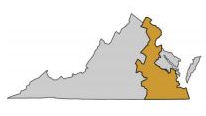 Inaction on growing traffic congestion in the state’s urban crescent is undermining the state’s quality of life and its economic competitiveness, warn 38 “mayors and chairs” of Virginia local governments in a letter to Governor Bob McDonnell and leaders of the General Assembly.
Inaction on growing traffic congestion in the state’s urban crescent is undermining the state’s quality of life and its economic competitiveness, warn 38 “mayors and chairs” of Virginia local governments in a letter to Governor Bob McDonnell and leaders of the General Assembly.
“The Urban Crescent’s economic health is vital to the Commonwealth, and without new investments in multimodal transportation, each of our regions’ economies will decline, resulting in less revenue available to meet the myriad of Virginia’s needs,” stated the letter. The state’s diminishing competitiveness was reflected in Virginia’s decline from the No. 1 spot in CNBC’s “America’s Top States for Business” to No. 3 this summer, caused primarily by a plummeting score for “Infrastructure and Transportation,” which plummeted from No. 1o to No. 33.
In June local elected officials met to discuss Virginia’s transportation challenges. This letter “is an attempt to call attention to an important issue,” says Bryan Pennington, in Norfolk’s office of intergovernmental relations. “It really is at a crisis level.”
The letter did not propose specific solutions, focusing instead on documenting the severity of the problem. Among the key points made:
- State secondary and urban system construction funds have been eliminated.
- By 2017, no state funds will be available for highway construction, and the Commonwealth will be unable to fully match federal funds.
- Approximately 26% of state-maintained roadways are in poor condition. The percentage is 39% in Northern Virginia, 36% in Hampton Roads and 31% in Richmond.
- Only 66 percent of Virginia’s secondary roads currently meet pavement performance targets. The cost of meeting VDOT’s goal of 82 percent of secondary roads in fair or better condition could be $1.3 billion to $1.8 billion.
- Transit funding is far short of what is needed.
- According to the Texas Transportation Institute, Richmond area commuters waste 20 hours per year stuck in traffic, Hampton Roads commuters waste 34 hours and Northern Virginia commuters waste 74 hours.
“Inaction is a “traffic tax” on our localities, our residents, our visitors, and our businesses, through decreased productivity, diminished quality of life, higher fuel costs, higher maintenance costs, and increased pollution,” the letter stated. The state needs to invest more in transportation infrastructure, it added, and the investment must come from “stable, reliable, permanent and balanced” sources.
— JAB


